-

新人教版高中英语必修3Unit 5 The Value of Money- Discovering Useful Structure教学设计
Step 3 Meaning1. 过去将来时表示从过去某一时间来看将要发生的动作或存在的状态, 常用在宾语从句中。一般由“would/should +动词原形”构成。She hoped that they would meet again someday. 她希望将来有一天他们能再见面。2. was/were going to+动词原形: 表示过去将要发生或很有可能发生的动作, 常用于口语中, 表示预言、意图或者打算等。He was going to start work the following week. 他打算下星期开始工作。3. was/were about to do: 常用来表示即将发生的动作, “刚要/正要做……”。注意该结构不与任何时间状语连用。I felt that something terrible was about to happen. 我感到某种可怕的事情即将发生。4.was/were to do: 表示“曾计划做某事”, 如果表示“本来计划做某事, 动作没实现”, 则需用 “was/were to have done”。She said she was to have told me about the accident. 她说她本来想告诉我关于事故的事。5.Start, go, come, leave, see, meet等动词的过去进行时: 表示就过去某一时刻而言即将发生的动作。She was coming later. 她随后就来。I had just put on my overcoat and was leaving to visit a friend of mine. 我刚穿上外套要去看我的一个朋友。

新人教版高中英语必修3Unit 5 The Value of Money-Listening &Speaking&Talking教学设计
4. A:We’d like to have someone to say a word at the beginning to welcome the group.B:↙Who?A:We thought that you or Dr.Johnson might do it.B用降调说Who,其意思是问,对方想让谁在开场时致欢迎词。Step 6 Pronunciation---Practice1. Listen to the short conversation and mark the intonation with ↗, ↙ or ↙, ↗. Then discuss with a partner what they intend to convey by using different intonation.Owner: You know what ?↗ It’s a million-pound bank note↙.Waiter 1: Really ?↗(question)Waiter 2: Really !↙(unbelievable and surprised)Waiter 3: Really ?!↙↗(first question then surprised)2. Listen to the conversations. Underline the parts that are stressed and mark the intonation. Then talk about the implied meanings of the responses with different intonations. Listen again and repeat.1) Henry: It’s a nice suit.Owner: Oh, it’s perfect!↙(The intonation means it is very suitable for Henry.)2) Henry: Well, that’s very kind of you.Owner: Kind, sir ?↗(what you said is not right) No, it’s kind of you. You must come whenever you want and have whatever you like. Just having you sit here is a great honour !!↙(welcome you to come again)3)Henry:Well, to be honest, I have none. Oliver:(happily) What luck!(excited) Brother↗, what luck!↙(It means “Didn’t you hear it?”)Henry: Well, it may seem lucky to you but not to me!↗(angry) If this is your idea of some kind of joke, I don’t think it’s very funny. Now if you’ll excuse me, I ought to be on my way.↙(If so, I would leave.)Roderick: Please don’t go↙...(hope Henry can wait for a moment)Part B Viewing and Talking---Describe people’s changing attitudes in a film clipStep 1 Before-listening---Tell the filmYou are going to watch part of the film The Million Pound Bank Note. Look at these photos and guess what happens in the film.

新人教版高中英语必修3Unit 5 The Value of Money-Listening &Speaking教学设计
Step 4: Listen again and decide if the following statements are true (T) or false (F).1 It was the first time Chen Liyan's story was reported. T口 F口2 Chen found 10,000 yuan in a small plastic bag in Taiyuan railway station口 F口3 Wang Zheng apologized to Chen because he couldn't offer her more money. T口 F口4 Chen took out a large loan to cure her daughter, T口 F口5 Wang set up a fundraising website for Chen's daughter after Chen told him about her situation. T口 F口Step 5:After listening, discuss the questions.1 What kind of person do you think Chen Liyan is?Chen Liyan is generous and honest because she returned a large sum of money to the owner.2 Did Chen return the money because she didn't need it?No. She returned the money because it was the right thing to do. Evidence for this is that she refused to accept the reward money because she felt that it had not been earned. 3 Is it common for people to do what Chen did?It depends on the culture. In some countries it is quite common to return money that has been found. In other countries, people believe "Finders are keepers!" 4 How did Wang Zheng feel about the return of his money?He must have been very happy and relieved to have gotten his money back. We know this because he thanked Chen repeatedly and even offered her a reward.5 Why did Ma Dongbao tell Wang about Chen's family?He must have had great sympathy for Chen and her daughter and wanted to help them.'We know this because he arranged help for them. 6 How did the news reporter feel about Chen's actions?The news reporter felt that it showed that money wasn't the most important thing in life. We know this because the reporter told us that this is what Chen believes. and then said, “that's a great attitude to take."

新人教版高中英语选修2Unit 1 Science and Scientists-Discovering useful structures教学设计
The grammatical structure of this unit is predicative clause. Like object clause and subject clause, predicative clause is one of Nominal Clauses. The leading words of predicative clauses are that, what, how, what, where, as if, because, etc.The design of teaching activities aims to guide students to perceive the structural features of predicative clauses and think about their ideographic functions. Beyond that, students should be guided to use this grammar in the context apporpriately and flexibly.1. Enable the Ss to master the usage of the predicative clauses in this unit.2. Enable the Ss to use the predicative patterns flexibly.3. Train the Ss to apply some skills by doing the relevant exercises.1.Guide students to perceive the structural features of predicative clauses and think about their ideographic functions.2.Strengthen students' ability of using predicative clauses in context, but also cultivate their ability of text analysis and logical reasoning competence.Step1: Underline all the examples in the reading passage, where noun clauses are used as the predicative. Then state their meaning and functions.1) One theory was that bad air caused the disease.2) Another theory was that cholera was caused by an infection from germs in food or water.3) The truth was that the water from the Broad Street had been infected by waste.Sum up the rules of grammar:1. 以上黑体部分在句中作表语。2. 句1、2、3中的that在从句中不作成分,只起连接作用。 Step2: Review the basic components of predicative clauses1.Definition

新人教版高中英语选修2Unit 4 Journey Across a Vast Land教学设计
当孩子们由父母陪同时,他们才被允许进入这个运动场。3.过去分词(短语)作状语时的几种特殊情况(1)过去分词(短语)在句中作时间、条件、原因、让步状语时,相当于对应的时间、条件、原因及让步状语从句。Seen from the top of the mountain (=When it is seen from the top of the mountain), the whole town looks more beautiful.从山顶上看,整个城市看起来更美了。Given ten more minutes (=If we are given ten more minutes), we will finish the work perfectly.如果多给十分钟,我们会完美地完成这项工作。Greatly touched by his words (=Because she was greatly touched by his words), she was full of tears.由于被他的话深深地感动,她满眼泪花。Warned of the storm (=Though they were warned of the storm), the farmers were still working on the farm.尽管被警告了风暴的到来,但农民们仍在农场干活。(2)过去分词(短语)在句中作伴随、方式等状语时,可改为句子的并列谓语或改为并列分句。The teacher came into the room, followed by two students (=and was followed by two students).后面跟着两个学生,老师走进了房间。He spent the whole afternoon, accompanied by his mom(=and was accompanied by his mom).他由母亲陪着度过了一整个下午。

新人教版高中英语选修2Unit 1 Science and Scientists-Learning about Language教学设计
Step 7: complete the discourse according to the grammar rules.Cholera used to be one of the most 1.__________ (fear) diseases in the world. In the early 19th century, _2_________ an outbreak of cholera hit Europe, millions of people died. But neither its cause, 3__________ its cure was understood. A British doctor, John Snow, wanted to solve the problem and he knew that cholera would not be controlled _4_________ its cause was found. In general, there were two contradictory theories 5 __________ explained how cholera spread. The first suggested that bad air caused the disease. The second was that cholera was caused by an _6_________(infect) from germs in food or water. John Snow thought that the second theory was correct but he needed proof. So when another outbreak of cholera hit London in 1854, he began to investigate. Later, with all the evidence he _7_________ (gather), John Snow was able to announce that the pump water carried cholera germs. Therefore, he had the handle of the pump _8_________ (remove) so that it couldn't be used. Through his intervention,the disease was stopped in its tracks. What is more, John Snow found that some companies sold water from the River Thames that __9__________________ (pollute) by raw waste. The people who drank this water were much more likely _10_________ (get) cholera than those who drank pure or boiled water. Through John Snow's efforts, the _11_________ (threaten) of cholera around the world saw a substantial increase. Keys: 1.feared 2.when 3. nor 4.unless 5.that/which 6.infection 7.had gathered 8.removed 9.was polluted 10.to get 11. threat

新人教版高中英语选修2Unit 1 Science and Scientists-Reading and thinking教学设计
Step 5: After learning the text, discuss with your peers about the following questions:1.John Snow believed Idea 2 was right. How did he finally prove it?2. Do you think John Snow would have solved this problem without the map?3. Cholera is a 19th century disease. What disease do you think is similar to cholera today?SARS and Covid-19 because they are both deadly and fatally infectious, have an unknown cause and need serious public health care to solve them urgently.keys:1. John Snow finally proved his idea because he found an outbreak that was clearly related to cholera, collected information and was able to tie cases outside the area to the polluted water.2. No. The map helped John Snow organize his ideas. He was able to identify those households that had had many deaths and check their water-drinking habits. He identified those houses that had had no deaths and surveyed their drinking habits. The evidence clearly pointed to the polluted water being the cause.3. SARS and Covid-19 because they are both deadly and fatally infectious, have an unknown cause and need serious public health care to solve them urgently.Step 6: Consolidate what you have learned by filling in the blanks:John Snow was a well-known _1___ in London in the _2__ century. He wanted to find the _3_____ of cholera in order to help people ___4_____ it. In 1854 when a cholera __5__ London, he began to gather information. He ___6__ on a map ___7___ all the dead people had lived and he found that many people who had ___8____ (drink) the dirty water from the __9____ died. So he decided that the polluted water ___10____ cholera. He suggested that the ___11__ of all water supplies should be _12______ and new methods of dealing with ____13___ water be found. Finally, “King Cholera” was __14_____.Keys: 1. doctor 2. 19th 3.cause 4.infected with 5.hit 6.marked 7.where 8.drunk 9.pump 10.carried 11.source 12.examined 13.polluted 14.defeatedHomework: Retell the text after class and preview its language points

新人教版高中英语选修2Unit 1 Science and Scientists-Using langauge教学设计
This happens because the dish soap molecules have a strong negative charge, and the milk molecules have a strong positive charge. Like magnets, these molecules are attracted to each other, and so they appear to move around on the plate, taking the food coloring with them, making it look like the colors are quickly moving to escape from the soap.Listening text:? Judy: Oh, I'm so sorry that you were ill and couldn't come with us on our field trip. How are you feeling now? Better?? Bill: Much better, thanks. But how was it?? Judy: Wonderful! I especially liked an area of the museum called Light Games.it was really cool. They had a hall of mirrors where I could see myself reflected thousands of times!? Bill: A hall of mirrors can be a lot of fun. What else did they have?? Judy: Well, they had an experiment where we looked at a blue screen for a while, and then suddenly we could see tiny bright lights moving around on it. You'll never guess what those bright lights were!? Bill: Come on, tell me!? Judy: They were our own blood cells. For some reason, our eyes play tricks on us when we look at a blue screen, and we can see our own blood cells moving around like little lights! But there was another thing I liked better. I stood in front of a white light, and it cast different shadows of me in every color of the rainbow!? Bill: Oh, I wish I had been there. Tell me more!? Judy: Well, they had another area for sound. They had a giant piano keyboard that you could use your feet to play. But then, instead of playing the sounds of a piano, it played the voices of classical singers! Then they had a giant dish, and when you spoke into it, it reflected the sound back and made it louder. You could use it to speak in a whisper to someone 17 meters away.? Bill: It all sounds so cool. I wish I could have gone with you? Judy: I know, but we can go together this weekend. I'd love to go there again!? Bill: That sounds like a great idea!

新人教版高中英语选修2Unit 2 Bridging Cultures-Discovering useful structures教学设计
The grammar of this unit is designed to review noun clauses. Sentences that use nouns in a sentence are called noun clauses. Nominal clauses can act as subject, object, predicate, appositive and other components in compound sentences. According to the above-mentioned different grammatical functions, nominal clauses are divided into subject clause, object clause, predicate clause and appositive clause. In this unit, we will review the three kinds of nominal clauses. Appositive clauses are not required to be mastered in the optional compulsory stage, so they are not involved.1. Guide the students to judge the compound sentences and determine the composition of the clauses in the sentence.2. Instruct students to try to learn grammar by generalizing grammar rules, controlling written practice, and semi-open oral output.3. Inspire the students to systematize the function and usage of noun clause1.Instruct students to try to learn grammar by generalizing grammar rules, controlling written practice, and semi-open oral output.2.Inspire the students to systematize the function and usage of noun clauseStep1: The teacher ask studetns to find out more nominal clauses from the reading passage and udnerline the nominal clauses.

新人教版高中英语选修2Unit 3 Food and Culture-Discovering useful structures教学设计
The newspaper reported more than 100 people had been killed in the thunderstorm.报纸报道说有一百多人在暴风雨中丧生。(2)before、when、by the time、until、after、once等引导的时间状语从句的谓语是一般过去时,以及by、before后面接过去的时间时,主句动作发生在从句的动作或过去的时间之前且表示被动时,要用过去完成时的被动语态。By the time my brother was 10, he had been sent to Italy.我弟弟10岁前就已经被送到意大利了。Tons of rice had been produced by the end of last month. 到上月底已生产了好几吨大米。(3) It was the first/second/last ... time that ...句中that引导的定语从句中,主语与谓语构成被动关系时,要用过去完成时的被动语态。It was the first time that I had seen the night fact to face in one and a half years. 这是我一年半以来第一次亲眼目睹夜晚的景色。(4)在虚拟语气中,条件句表示与过去事实相反,且主语与谓语构成被动关系时,要用过去完成时的被动语态。If I had been instructed by him earlier, I would have finished the task.如果我早一点得到他的指示,我早就完成这项任务了。If I had hurried, I wouldn't have missed the train.如果我快点的话,我就不会误了火车。If you had been at the party, you would have met him. 如果你去了晚会,你就会见到他的。

新人教版高中英语选修2Unit 3 Food and Culture-Reading and thinking教学设计
The discourse explores the link between food and culture from a foreign’s perspective and it records some authentic Chinese food and illustrates the cultural meaning, gerography features and historic tradition that the food reflects. It is aimed to lead students to understand and think about the connection between food and culture. While teaching, the teacher should instruct students to find out the writing order and the writer’s experieces and feelings towards Chinese food and culture.1.Guide the students to read the text, sort out the information and dig out the topic.2.Understand the cultural connotation, regional characteristics and historical tradition of Chinese cuisine3.Understand and explore the relationship between food and people's personality4.Guide the students to use the cohesive words in the text5.Lead students to accurately grasp the real meaning of the information and improve the overall understanding ability by understanding the implied meaning behind the text.1. Enable the Ss to understand the structure and the writing style of the passage well.2. Lead the Ss to understand and think further about the connection between food and geography and local character traits.Step1: Prediction before reading. Before you read, look at the title, and the picture. What do you think this article is about?keys:It is about various culture and cuisine about a place or some countries.

新人教版高中英语选修2Unit 5 First Aid-Discovering useful structures教学设计
You have no excuse for not going.你没有理由不去。He was punished for not having finished his homework.他因未完成作业而受到惩罚。2.动词ing形式复合结构由物主代词或人称代词宾格、名词所有格或普通格加动词ing,即“sb./sb.'s+doing”构成。动词ing形式的复合结构实际上是给动词ing形式加了一个逻辑主语。动词ing形式的复合结构有四种形式:①形容词性物主代词+动词ing②名词所有格+动词ing③代词宾格+动词ing④名词+动词ingHer coming to help encouraged all of us.她来帮忙鼓舞了我们所有人。The baby was made awake by the door suddenly shutting.这个婴儿被突然的关门声吵醒了。Can you imagine him/Jack cooking at home?你能想象他/杰克在家做饭的样子吗?无生命名词无论是作主语还是作宾语都不能用第②种形式。Tom's winning first prize last year impressed me a lot.汤姆去年得了一等奖使我印象深刻。Do you mind my/me/Jack's/Jack leaving now?你介意我/杰克现在离开吗?Excuse me for my not coming on time.很抱歉我没能按时来。His father's being ill made him worried.他父亲病了,他很担心。We are looking forward to the singer's/the singer to give us a concert.我们盼望着这位歌手来给我们举办一场演唱会。
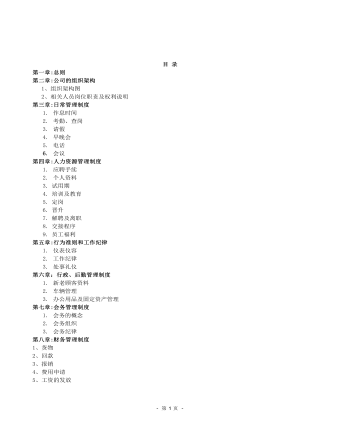
公司管理制度大全(适用于中小公司)
1. 应聘手续所有应聘者均应填写《应聘登记表》并提供个人简历,学历证书复印件、身份证复印件等有关证明资料,并附个人1寸或2寸免冠彩色照片2张.2. 个人资料个人资料需填写完整,且无误,本人需对资料的真实性负责,一旦发现资料虚假且情节严重着予以辞退,其主要包括:姓名,身份证号(身份证真假性),家庭原地址,隐瞒身体有传染性或严重性疾病,原工作单位名称以及离职原因,家庭成员以及电话,地址。3. 试用期A、新进员工试用期3个月.(员工未满15天自动离职者将不计工资,7天内公司劝退者将不计工资)B、试用期内,公司将对员工的工作态度(学习和遵守公司的规章制度、与同事和睦相处、人品),工作能力(接受培训能力、业务素质的理解能力)及工作绩效等进行考核(见《新员工考核表》),考核合格者将转为正式职工,对考核不合格者,公司将予以辞退或不计薪酬再学习.C、员工因工作绩效出色可提前结束试用期,经直接上司或负责人提案,报人力资源批准后可予提前转为正式员工.4、培训,教育 新进员工进入公司后都会进行入职培训,主要有以下内容: A、公司相关情况 B、产品、市场、客户相关情况 C、公司的业务流程 D、各项管理制度的学习5、定岗 A、定岗时间:1-3个月试用期过后,根据员工的培训情况和综合素质和能力定岗。 B、定岗的原则:最高部长级别的定岗先从副职开始定岗。 C、定岗和工资级别挂钩。6、晋职A、为了提供员工更广的发展空间,对于工作业绩,能力,品行,学识佳的员工将予以升职.B、晋职头1个月为试升期,试升期内薪资不予调整,试升期满且符合晋职条件者,则公司将正式委任该职,并予以调整薪资.C、晋职后的薪资标准参照员工薪资制度。7、解聘及离职A、员工若违反本公司的规章制度,则公司将视情节轻重,给予必要的处分,对情节严重者,公有权根据相关规定辞退员工,辞退的员工必须做好顾客及相关物品的交接工作。B、员工若要提出辞职,员工应提前15天书面通知人事部,负责人或管理干部应提前1个月书面通知人事部,并按辞职流程及相关交接工作办妥手续后方可离职.8、交接程序当员工与本公司结束雇佣关系时,应先办理好交接手续。包括:A、交接公司固定资产及相关资料B、交接工作内容C、填写离职单。9、员工福利A、为员工提供工作服装。B、正式入职后办理意外伤害保险。C、享受传统重大节日福利
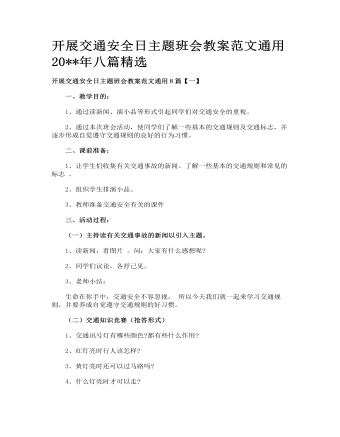
开展交通安全日主题班会教案范文通用八篇精选
骑自行车的交通安全 我国是自行车大国,许多年满12周岁的同学都骑自行车上学,骑自行车应注意哪些问题呢?下面请听一名同学朗诵《安全骑车歌》。 安全骑车歌 同学们骑自行车,听我唱段安全歌。 车铃好使闸要灵,有了情况车能停。 上街注意看信号,千万不要冒险行。 信号就是指挥员,骑车第一讲安全。 看见红灯快刹闸,该等多久等多久。 绿灯亮了才能行,安全通行不争抢。 十字路口人车多,左右观察听八方。 骑车带人危险大,攀扶车辆更可怕。 中速骑车靠右侧,分道行驶路畅通。 骑车拐弯要示意,不能猛拐一溜风。 手拉手儿把肩摸,十有八、九要撞车。 双手离把更不行,撞上汽车命归西。 骑车不走一条线,东摇西摆像醉汉。 不定哪天出事故,头破血流住医院。 驮载东西别超宽,超高超长也危险。 骑车让让讲安全,事情虽小不平凡。
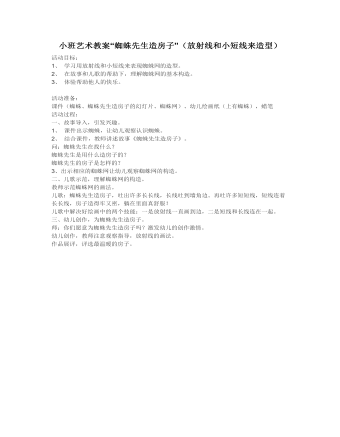
小班艺术教案“蜘蛛先生造房子”(放射线和小短线来造型
2、 在故事和儿歌的帮助下,理解蜘蛛网的基本构造。 3、 体验帮助他人的快乐。 活动准备: 课件(蜘蛛、蜘蛛先生造房子的幻灯片、蜘蛛网)、幼儿绘画纸(上有蜘蛛),蜡笔 活动过程: 一、故事导入,引发兴趣。 1、 课件出示蜘蛛,让幼儿观察认识蜘蛛。 2、 结合课件,教师讲述故事《蜘蛛先生造房子》。 问:蜘蛛先生在找什么? 蜘蛛先生是用什么造房子的? 蜘蛛先生的房子是怎样的? 3、出示相应的蜘蛛网让幼儿观察蜘蛛网的构造。
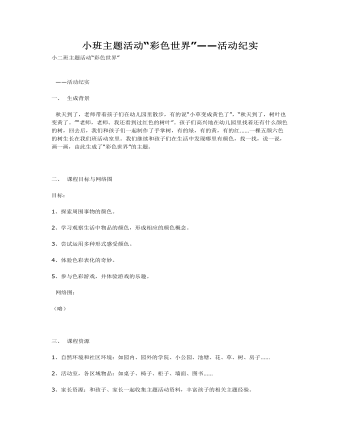
小班主题活动“彩色世界”——活动纪实课件教案
一、 生成背景 秋天到了,老师带着孩子们在幼儿园里散步,有的说“小草变成黄色了”,“秋天到了,树叶也变黄了。”“老师,老师。我还看到过红色的树叶”。孩子们高兴地在幼儿园里找着还有什么颜色的树,回去后,我们和孩子们一起制作了手掌树,有的绿,有的黄,有的红……一棵五颜六色的树生长在我们班活动室里。我们继续和孩子们在生活中发现哪里有颜色,找一找,说一说,画一画,由此生成了“彩色世界”的主题。 二、 课程目标与网络图 目标: 1、探索周围事物的颜色。 2、学习观察生活中物品的颜色,形成相应的颜色概念。 3、尝试运用多种形式感受颜色。 4、体验色彩表化的奇妙。 5、参与色彩游戏,并体验游戏的乐趣。
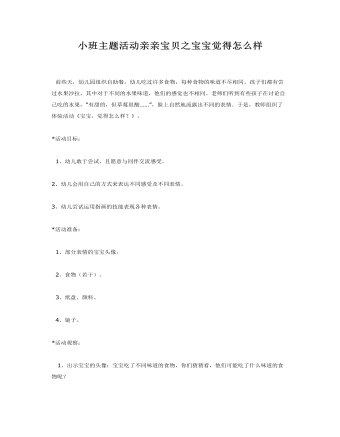
小班主题活动亲亲宝贝之宝宝觉得怎么样课件教案
活动目标: 1、幼儿敢于尝试,且愿意与同伴交流感受。2、幼儿会用自己的方式来表达不同感受及不同表情。3、幼儿尝试运用指画的技能表现各种表情。*活动准备: 1、部分表情的宝宝头像。 2、食物(若干)。 3、纸盘、颜料。 4、镜子。

《念奴娇 赤壁怀古》说课稿(一) 统编版高中语文必修上册
一、说教材:(一)教材的地位和作用《念奴娇﹒赤壁怀古》是部编版高中语文教材必修上册第9课的课文。它与辛弃疾的《永遇乐﹒京口北固亭怀古》,李清照的《声声慢》共同入选该册教材第三单元阅读古诗词,感悟人生这一学习专题。本词是苏轼的代表作,也是豪放词的名篇,在古诗词教学中占有重要的地位。优美的诗词是中华传统文化的瑰宝,学习这些诗词的目的在于培养学生鉴赏古代诗词作品的能力,在分析、鉴赏中感悟前人丰饶的情思,博大的智慧,从而提高学生的人文素养,提高文化品味。这首词写于元丰五年,是苏轼被贬黄州游赤鼻矶所作。本词感情激荡,意境雄浑壮阔。全词融写景、咏史、抒情为一体。通过学习,学生可以获得一些鉴赏诗词的基本要领,领略壮阔意境,感受豪放词风;同时学习苏轼在逆境中依然乐观旷达的人生观。
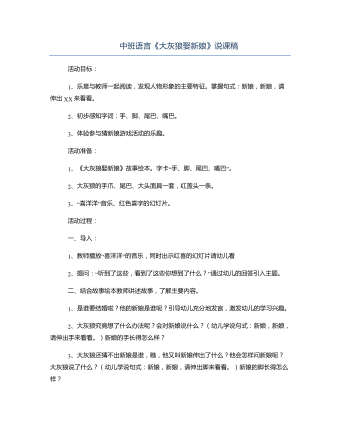
中班语言《大灰狼娶新娘》说课稿
结合故事绘本教师讲述故事,了解主要内容。1、是谁要结婚啦?他的新娘是谁呢?引导幼儿充分地发言,激发幼儿的学习兴趣。2、大灰狼究竟想了什么办法呢?会对新娘说什么?(幼儿学说句式:新娘,新娘,请伸出手来看看。)新娘的手长得怎么样?3、大灰狼还猜不出新娘是谁,瞧,他又叫新娘伸出了什么?他会怎样问新娘呢?大灰狼说了什么?(幼儿学说句式:新娘,新娘,请伸出脚来看看。)新娘的脚长得怎么样?4、大灰狼还是不敢确定自己的新娘是谁,他又会请新娘伸出什么呢?大灰狼说了什么?(幼儿学说句式:新娘,新娘,请伸出尾巴来看看。)新娘的尾巴长得怎么样?5、大灰狼最后又会请新娘伸出什么呢?大灰狼说了什么?(幼儿学说句式:新娘,新娘,请伸出嘴巴来看看。)新娘的嘴巴长得怎么样?6、大灰狼的新娘有着长满毛的手、尖尖爪子的脚、又粗又长的尾巴、还有一张长着尖牙齿、红舌头的嘴巴,她到底是谁呀?教师揭示谜底。
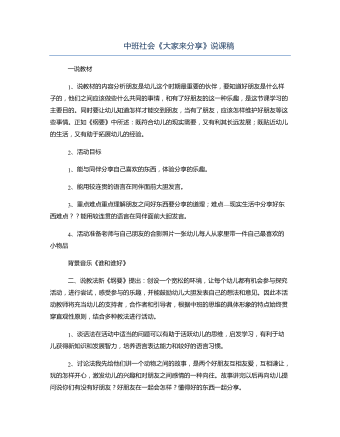
中班社会《大家来分享》说课稿
1、我先讲故事给幼儿听,让他们理解朋友的含义老师出示与朋友合影的照片,讲一讲与好朋友在一起的情景,趣事。(突出一起分享主题)幼儿讨论:好朋友在一起应该怎样?懂得好东西一起分享。介绍自己的小物品,尝试与朋友分享。今天小朋友们都把自己喜欢的小物品带来了,请你给大家说说你的物品是什么?怎样玩?你们带来的小物品太好玩了,你的朋友也想玩一玩,快去找个朋友交换着玩,这样你就会有更多个玩具了。播放背景音乐,引导幼儿自由结伴交换物品进行分享。老师注意引导幼儿能和更多的小朋友进行分享,进一步体会到分享的意义。讲一讲分享中发生的趣事,体验分享的乐趣。你和谁交换的,你们是怎样玩的?心里有什么感觉?有不愉快的事情发生吗?你们是怎样解决的?

